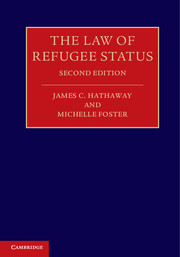Book contents
- Frontmatter
- Contents
- Acknowledgments
- Table of cases
- Table of treaties and other international instruments
- Abbreviations for courts and tribunals cited
- Introduction
- 1 Alienage
- 2 Well-founded fear
- 3 Serious harm
- 4 Failure of state protection
- 5 Nexus to civil or political status
- 6 Persons no longer needing protection
- 7 Persons not deserving protection
- Index
- References
3 - Serious harm
Published online by Cambridge University Press: 05 July 2014
- Frontmatter
- Contents
- Acknowledgments
- Table of cases
- Table of treaties and other international instruments
- Abbreviations for courts and tribunals cited
- Introduction
- 1 Alienage
- 2 Well-founded fear
- 3 Serious harm
- 4 Failure of state protection
- 5 Nexus to civil or political status
- 6 Persons no longer needing protection
- 7 Persons not deserving protection
- Index
- References
Summary
Although the requirement to show a well-founded fear of “being persecuted” is at the heart of the refugee definition, the Refugee Convention does not define or elucidate the meaning to be given to this concept. Indeed, it is generally acknowledged that the drafters of the Convention intentionally declined to define “being persecuted” because they recognized the impossibility of enumerating in advance all of the forms of maltreatment that might legitimately entitle persons to benefit from international protection. The need for a flexible approach to “being persecuted” is especially important today given the duty under the 1967 Protocol to apply the refugee definition in a manner that ensures its relevance to “new refugee situations.”
Yet the importance of interpretive flexibility must be balanced against the imperatives of the rule of law, militating against any approach that “abandon[s] the quest for standards” in interpreting what is perhaps the key term of the treaty. Rather, as Lord Justice Laws explained in Sepet:
However wide the canvas facing the judge’s brush, the image he makes has to be firmly based on some conception of objective principle which is recognized as a legitimate source of law.
The challenge, then, is to adopt an approach to interpretation of “being persecuted” that is flexible, yet which provides guidance based on objective principle. The goal must be to understand the core construct of “being persecuted” as “a living thing, adopted by civilised countries for a humanitarian end which is constant in motive but mutable in form.”
- Type
- Chapter
- Information
- The Law of Refugee Status , pp. 182 - 287Publisher: Cambridge University PressPrint publication year: 2014
References
- 2
- Cited by



